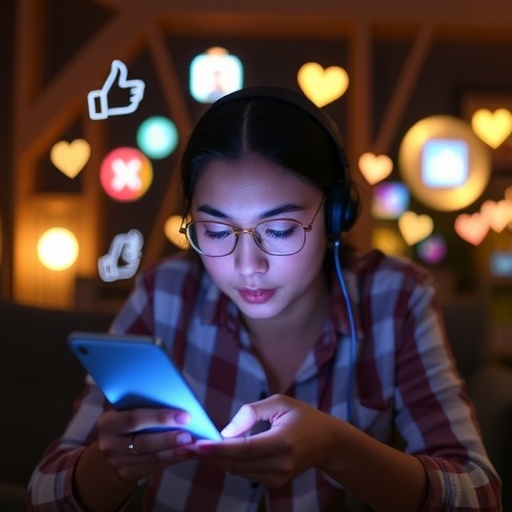In an era dominated by digital interactions, understanding the intricate dynamics between social media use and mental health has become paramount. The relationship between these two spheres is multifaceted, reflecting how individuals engage with technology while navigating their emotional and psychological landscapes. A recent study by Opoku et al. sheds light on this complex interplay, revealing significant insights into the implications of social media consumption on mental well-being.
The digital age has transformed the way people connect. Social media platforms have emerged as primary avenues for communication, enabling users to maintain relationships, share experiences, and access vast amounts of information quickly. However, this shift has raised pertinent questions about its effects on mental health. The study emphasizes that while social media can enhance social connectivity, it can also lead to feelings of isolation, anxiety, and depression.
Diving deeper into the evidence, the researchers employed a mixed-methods approach, incorporating both quantitative surveys and qualitative interviews. This comprehensive methodology allowed them to capture a broad spectrum of experiences among social media users. Participants reported diverse feelings associated with social media use, ranging from feelings of euphoria during connections with friends to profound sadness triggered by comparisons with others. Such findings underscore the dual nature of social media as both a tool for social engagement and a potential source of mental distress.
One of the critical elements of the study is the role of social comparison. Many users engage in comparing their lives, experiences, and successes with those portrayed by their peers online. This phenomenon can lead to a distorted self-image and lower self-esteem. The researchers found that individuals who spent more time on social media were more likely to internalize these negative comparisons, thereby heightening their risk of developing mental health issues. This effect is particularly pronounced among adolescents, who are often more susceptible to external influences and peer pressure.
Moreover, the study delves into the type of content consumed on social media platforms. It evaluates how exposure to harmful or unrealistic portrayals, such as curated lifestyles and idealized beauty standards, can contribute to psychological issues. Participants highlighted that often, social media feeds are inundated with aesthetically pleasing images that do not reflect reality. This consistent exposure fosters a culture of unrealistic expectations and can spiral into feelings of inadequacy.
Conversely, the research also illuminated the positive aspects of social media. Many users highlighted the supportive communities that exist in these digital spaces, where individuals can find solace and understanding amid their struggles. For instance, mental health awareness campaigns and supportive groups dedicated to various issues have gained traction on these platforms, offering valuable resources and fostering a sense of belonging for those in distress.
Technology also provides innovative solutions for mental health support. Teletherapy and online support groups are gaining popularity, enabling individuals to seek help in more accessible and less intimidating environments. The study provided evidence that some individuals found it easier to engage in mental health discussions through social media than in person, indicating a critical shift in how mental health discourse occurs in the digital age.
However, the authors caution against an over-reliance on social media as a substitute for professional help. The study contemplates the potential dangers associated with self-diagnosis and unverified information concerning mental health. As misinformation can proliferate rapidly on these platforms, the need for discernment and critical engagement with content becomes vital for users seeking to protect their mental well-being.
Another discussion point in the study revolves around the concept of digital detox. Researchers argue that taking breaks from social media can significantly improve mental health outcomes. Participants who engaged in regular digital detox seemed to report enhancements in mood and overall psychological well-being. This insight highlights the crucial balance individuals must strike between enjoying the benefits of social media while mitigating potential adverse effects.
Additionally, the implications of the study extend beyond individual users, touching on broader societal concerns. It raises questions about how social media companies curate content and how algorithms might inadvertently exacerbate mental health issues. This calls for increased responsibility among platforms to consider the psychological impact of their design choices and content promotions.
As policymakers and tech giants grapple with these findings, initiatives aimed at fostering healthier online environments become increasingly crucial. The researchers advocate for educational programs that promote digital literacy, helping users navigate the complexities of social media while safeguarding their mental health. Such programs could prepare users to engage with social media in healthier ways, cultivating a culture of awareness and intentionality.
Ultimately, the research conducted by Opoku et al. offers a comprehensive look at the nuanced relationship between social media use and mental health in our contemporary world. By amplifying both the positive and negative aspects, the study serves as a crucial reminder of the power of digital interactions and the responsibility users and platforms alike have in fostering a healthy online ecosystem.
As social media continues to evolve, further research will undoubtedly be necessary to navigate the implications of future technological advancements on mental health. Understanding the deep-seated connections between our digital and mental lives will be essential as we forge ahead in this digital era.
Subject of Research: The relationship between social media use and mental health.
Article Title: Navigating the relationship between social media use and mental health in the digital age.
Article References:
Opoku, D., Donkor, C., Yeboah, J.N.O. et al. Navigating the relationship between social media use and mental health in the digital age. Discov Ment Health 5, 149 (2025). https://doi.org/10.1007/s44192-025-00285-4
Image Credits: AI Generated
DOI: 10.1007/s44192-025-00285-4
Keywords: Social media, mental health, digital age, social comparison, digital detox, community support.




